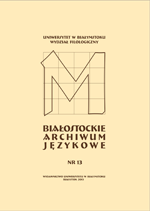The auditory priming effect in Japanese learners of English: effects of voice specificity and word stress patterns
The auditory priming effect in Japanese learners of English: effects of voice specificity and word stress patterns
Author(s): Tomoko Hori, Kaori SugiuraSubject(s): Language and Literature Studies, Foreign languages learning
Published by: Wydawnictwo Uniwersytetu w Białymstoku
Keywords: auditory priming; phonological representation; voice; stress patterns
Summary/Abstract: This study investigated whether and to what extent stimulus characteristics such as voices (same vs. different) and stress patterns (strong–weak vs. weak– strong) influence the auditory priming effect. The experiment involved 20 Japanese participants learning the English language, who were asked to listen to English words (half of them in the same voice or stress pattern as in a prior study session) and repeat them as quickly and accurately as possible. The participants were significantly faster at initiating word production, when the word was spoken in the same voice in the study and test phase. Our results also revealed that neither English proficiency nor stress patterns had any influence on the priming effect.
Journal: Białostockie Archiwum Językowe
- Issue Year: 2013
- Issue No: 13
- Page Range: 67-81
- Page Count: 15
- Language: English

